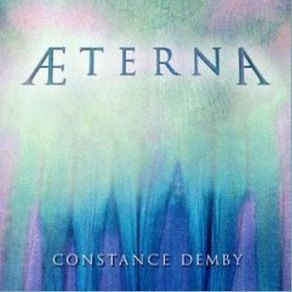Aeterna
Download links and information about Aeterna by Constance Demby. This album was released in 1995 and it belongs to New Age genres. It contains 6 tracks with total duration of 01:04:43 minutes.

|
|
|---|---|
| Artist: | Constance Demby |
| Release date: | 1995 |
| Genre: | New Age |
| Tracks: | 6 |
| Duration: | 01:04:43 |
| Buy it NOW at: | |
| Buy on iTunes $9.99 | |
| Buy on Amazon $9.49 | |
Tracks
[Edit]| No. | Title | Length |
|---|---|---|
| 1. | The Dawning | 10:22 |
| 2. | Ocean Without Shores | 5:45 |
| 3. | Innocence | 13:15 |
| 4. | Cry of the Heart | 6:20 |
| 5. | Eternal Return | 10:58 |
| 6. | Rites of Passage | 18:03 |
Details
[Edit]Constance Demby's monumental Novus Magnificat (1986) took its inspiration from the sacred choral and organ music of J.S. Bach. The overall impact of that piece was one of spiritual deliverance, that the heavens and all its angelic choirs arrived to welcome you. It is an incredibly moving piece, but Demby and her celestial inspiration gave the listener a gift, a spiritual "free ride," a release, an anointment. But with 1996's Aeterna, Demby has thankfully decided to pick up where Novus left off. Demby again uses digital samples to re-create lush orchestras, choirs, piano, and cello, but instead of Bach, she taps into the styles of Romantic composers such as Tchaikovsky, Rachmaninoff, and Anton Bruckner; this means stirring up emotions. The album begins with "The Dawning," which has the orchestral colors and the bright hopefulness of Grofe's dawn movement of The Grand Canyon Suite. "Ocean Without Shores" is a piano concerto that surfs themes wave after wave. The three-part "Innocence" has quieter spaces: a star-spangled hall with chimes and a delicate waltz, but later a cautious piano stalking through an orchestral canyon. "Cry of the Heart," awith its ponderous pulls and deep musings, features the mournful cello as the solo instrument. The broad piano/orchestral themes "Eternal Return" is powerfully sweeping. The final suite, "Rites of Passage," acontains Demby's most dynamic melodies and orchestration balanced with wind sounds and moments of abstract sonic dangling. The piano theme then reappears with the smoke and thunder of dragons. The next reappearance of the theme moves upscale with angel choirs, and eventually Demby brings the piece to plateaus of sonic serenity. If you actively listen to the whole album, it's quite possible your ribs will ache with cathartic anguish. If so, then Demby has succeeded; she dedicates the album to "the healing of the heart" and reexperiencing and releasing buried emotions. This awe inspiring and glorious album isn't the "free ride" of Novus Magnificat. This trip with Aeterna must be actively engaged, at least in the beginning listenings, as some music requires your full participation in order to receive the entire emotional impact.